- Home
- Alice Hoffman
Blue Diary Page 2
Blue Diary Read online
Page 2
You are everything to me, Ethan tells her on this morning, and maybe that sentiment was too arrogant and self-absorbed. Assuredly, they were only thinking of themselves, not of their son on his way to school, or the shades they hadn’t bothered to close, or the neighbor at her window, listening to the sounds of their desire. They weren’t the least bit concerned about the friends they’d kept waiting, Charlotte Kite, who’d already left the bakery for her doctor’s appointment, or Mark Derry, the plumber, one of Ethan’s closest friends, stranded outside the Starks’ house without a key, unable to work without Ethan present to let him in. The phone rings, long and loud, but Ethan tells Jorie not to answer - it’s only Charlotte, and Jorie can talk to her anytime. Or it’s her sister, Anne, whom Jorie is more than happy to avoid.
How often do we get to do this? Ethan asks. He kisses Jorie’s throat and her shoulders, and she doesn’t say no, even though it’s close to ten o’clock. How can she deny him, or herself for that matter? Love like this isn’t easy to find, after all, and sometimes Jorie wonders why she was the one whod been lucky enough to meet him that night. November in Massachusetts is a despicable and ruinous month, and Charlotte had needed to talk Jorie into going out for a drink. You have four whole life to sit around by yourself, if that’s what you want to do, Charlotte had assured her, and so Jorie had grudgingly gone along. She hadn’t even bothered to comb her hair or put on lipstick. She’d been there at the bar, already itching to leave, when she felt a wave of energy, the way some people say the air turns crackly before the weather takes a turn, or when a star is about to fall from the sky. She gazed to her left and she happened to see him, and that was when she knew it was destiny that had made her trail along after Charlotte on that damp, foggy night. Fate had led her here.
She closes her eyes on this, their stolen morning, and as she lets the phone ring unanswered, she thinks again of lilies, shimmering on their green stems. She thinks about the pledges they’ve made to each other, and about devotion. What she feels for him is so deep, she aches. She supposes this is what people refer to when they say the pangs of love, as if your innermost joy cannot help but cause you anguish as well. It is painful when he leaves her merely to go into the kitchen, where he fixes them iced coffees and bowls of strawberries from the garden. He loads their breakfast onto a silver tray, a wedding present from Charlotte, and brings it back to bed for them to enjoy. Jorie still has never seen a man as handsome as Ethan. He has dark hair and even darker eyes. He isn’t a lawyer cooped up in an office like Barney Stark, whose wife complains that he’s grown fat, or a beer drinker like Mark Derry, who spends most evenings sprawled out in an easy chair. Ethan uses his body, and the results are evident. When he takes off his shirt at the baseball field, the women stare at him, then look at each other as if to say, That’s what I wanted, but that’s not what I got.
All the same, Ethan is the sort of man who doesn’t seem to be aware of his own good looks. His visits to the gym aren’t driven by vanity, but are a necessity for the work he does as a member of the Monroe Volunteer Fire Department. He needs strength and stamina, both readily apparent last fall when he climbed onto the roof of the McConnells’ house, long before many of his fellow volunteers had gotten out of their trucks. That particular fire had started in a pan of bacon, but by the time the first volunteers arrived, it was burning through the house, one of those sly, scarlet infernos that moves with unexpected speed. There was so much smoke that day, the white chrysanthemums outside Hannah’s Coffee Shoppe turned gray and remained that way for the rest of the season; frogs in the shallows of the lake began to dig themselves into the mud, ready to hibernate, misreading the ashes falling from above for an early dusting of snow.
When it became clear that the regulation ladder wouldn’t reach the McConnells’ little girl’s window, Ethan had taken matters into his own hands. From his perch on the roof, he went on; he pulled himself across the shingles and over the peak, then went in through the window. Outside, the crowd watched as though bewitched. Not a word was said after Ethan disappeared through the window, especially not after the flames rose up, a burst of heat circling into the clotted gray sky. Ethan found the child hiding in her closet, and it was a lucky thing he’d been so nimble scaling the roof, for the girl hadn’t more than a few minutes left before she would have begun to suffocate. By the time Ethan carried her out of the house, half the town was gathered on the lawn below, holding their breaths, inhaling smoke, blinking the soot from their eyes.
It’s no wonder that people in Monroe adore Ethan Ford. Why, even Jorie’s sister, Anne. who on most occasions cannot find a nice word to say about anyone, is surprisingly well behaved in his presence. There’s rarely a time when Ethan walks down Front Street that some child he once coached doesn’t lean out a car window in order to shout his name and wave. The parents are just as pleased to see him; they honk their horns and switch their headlights on and off in a show of appreciation. Warren Peck, the bartender at the Safehouse and a courageous volunteer fireman himself, refuses to let Ethan pay for his own drinks, and why shouldn’t he be grateful? Ethan was the first on the scene when Warren’s nephew Kyle’s Chrysler LeBaron caught on fire in the parking lot of Lantern Lake, with sweet-tempered Kyle sleeping it off in the front seat, sure to have been burned alive if not for Ethan’s intervention. The senior center, where Ethan serves Thanksgiving dinner each year before coming home to celebrate the holiday with his family, still has a banner up in the rec room: Three Cheers for Ethan. Ethan himself would have already torn down that banner if the very idea didn’t chill some of the seniors to their bones, for the residents of the center sleep better w ith the knowledge that Ethan is watching over them.
He is truly an extraordinary person in many ways, even in the eyes of his wife. Jorie Ford gazes at her husband the way another woman might appraise the sunrise, with equal amounts of familiarity and awe. She had wished their son would resemble Ethan, but Collie Ford is pale and fine-featured, like his mother, with blond hair and blue eyes and a sweet, cautious nature. Collie is cool where his father is hot, easygoing and, at twelve, tall for his age. Still, he’s shy in spite of his parents’ love and support; he’s prone to let other boys edge right past him, at school and on the playing field, even though he has more brains and talent; it makes no difference that he’s bigger and stronger, he’s content to remain on the sidelines. He’s an A student happy with Bs, an outfielder who should be pitching, too good-natured, it sometimes seems, for the deceptions and the difficulties of those who excel in the world.
You know what his problem is? Ethan says as they lie in bed on this morning with the window shades drawn up and the bees in the garden drifting over blooming roses and phlox. Jorie is eating a strawberry and it has turned her mouth red. You baby him.
Oh, please. Jorie laughs. You’re just jealous. You want me to baby you.
That’s true. Ethan slides his hand between her legs and she feels those pangs begin. Baby me, he tells her, so near that every word burns. Give me what I want.
Jorie thinks of lily of the valley, hyacinths, star-of- Bethlehem. She thinks of the night they had made Collic, a starry August evening at Charlotte’s family’s vacation house at Squam Lalze. Jorie is sure her son was conceived there because a big white moon rose into the sky, a lantern in all that darkness, and she had cried when they made love. Afterward, she had stood out on the porch while Ethan slept and as she searched out the first summer star, she’d made a wish that things would never change between them.
I have to get going, Jorie says now, pushing him away. She feels absolutely derelict to still be in bed at this hour. I’m so late, Charlotte will kill me.
Jorie rises and stands squarely in the sunlight, her long hair turning from gold to platinum. She has never lived anywhere but Monroe, nor would she want to, even though this is a town in which there are more apple trees than there are houses. She had once believed she could predict exactly how her life would turn out, but then she met Ethan. There were several l
ocal boys who’d been after her, and she’d imagined that someday she’d give in and marry one of them. She still feels sheepish when she runs into Rick Moore, who she dated all through college. But bygones are bygones, and Rick himself is married now, with two boys of his own, and he teaches over at the middle school, science and health. Why, Collie will probably be in his class next year. There are no hard feelings, and when they meet accidentally, on Front Street or at the annual Little League barbecue at the end of the season, Rick and Jorie are always polite; they hug each other and pretend that neither one remembers the way Rick cried when Jorie broke up with him.
Time has drifted by lazily, and Jorie is amazed to see just how late it is. There won’t be much headway on the Starks’ construction today; no plumbing will be installed and no measurements for the new tub will be taken. By now Mark Derry has grown tired of waiting and has decided to leave a note for Ethan on the back door. Hey, asshole- where the hell were you? is the message Sophie Stark, aged twelve, will find tacked up when she gets home from school.
In point of fact, Ethan is getting dressed at the very moment Mark Derry is pounding his missive into place, using a nail he’d found in the dirt, used to add iron to the soil and encourage the hydrangeas to turn a deep indigo. Ethan Ford has never been one to rush, not even when he’s late. He takes his time and knows what he wants. He believes it’s his duty to live his life in the right way, and he never grouses when emergency calls come in on cold, icy nights. If he’s old-fashioned, so be it. He figures he owes something to his neighbors. He has never once turned down a friend when asked for a loan; Mark Derry and Warren Peck both know from personal experience that when Ethan writes a check he doesn’t even ask what the advance is for. Trying to thank him for all the good he’s done is another matter entirely. He flatly refused a public ceremony after he’d rescued the McConnell girl, which would have greatly pleased the mayor, Ed Hill, who’s always looking for a chance to promote his own favorite cause: a third term in office. Ethan is known for the sort of conviction only a man who’s been blessed can possess. What can he want, when there’s nothing he’s lacking? Why should he rush through this life, when he’s lucky enough to have everything he needs? He runs one hand through his dark hair now as he gets ready, without bothering to look in the mirror. He knows who he is, after all. Lucky as a man can be, that’s Ethan. Lucky, through and through.
Outside the window, the last milky petals from Mrs. Gage’s cherry tree are aloft in the air, weaving through the blue light, settling on rooftops and lawns, Jorie has gone into the kitchen to fill a Thermos with lemonade to ensure that Ethan will have a cool drink to enjoy later in the day. when the sun is high and the heat is all but unbearable as he carts old cabinets out of the Howards’ kitchen. Jorie smiles at what is already becoming a memory of how impulsive they’ve been today. She is the sort of woman who doesn’t need to tell her most private business, not even to her best friend. She has never been tempted to admit to Charlotte that she alwavs thinks of lilies when she and Ethan are in bed. Sometimes, at the height of their passion, she opens her eyes and is amazed to find white sheets and walls rather than the vivid fields she’s imagined, brilliant with orange and yellow, as if sunlight itself had been caught behind her eyes.
Someone once told Jorie that plants you least expected were members of the lily family- asparagus, for instance, and onions. both of which she plans to add to her garden, a large patch of earth in the backyard. Jorie doesn’t like to boast, but her garden is perhaps the best in town, yielding bushels of beans every year, and fire-red tomatoes, and such generous amounts of blueberries that Jorie often grants her neighbors free rein to pick as much as they’d like for jams and jellies and pies.
Jorie is thinking about her garden, how pretty asparagus plants will be against the fence, how faithful onions are once they take hold, when she hears someone at the front door. Right away she thinks something’s odd. It must be a stranger come to call, because everyone knows the Fords always use the kitchen door, which opens to the driveway and the garden. The postman, Bill Shannon, brings their mail around the back, and even Kat Willams, Collie’s friend from down the block, knows not to use the front entrance.
I’llget it, baby, Ethan says. He’s come into the kitchen to grab his key ring, stopping only to reach into the cookie jar for some petty cash he’ll use to buy lunch at Hannah’s later in the day. He looks happy as he heads for the hall. Jorie hears him open the door, and then she hears nothing. The silence is unnatural. It’s as if Jorie has been thrown headfirst into the cold embrace of the sea and water fills her ears. Rattled, she drops the coffee cup she was about to refill, but she doesn’t hear it break on the hardwood floor. She just leaves it there, in pieces, and hurries down the hall. She’s moving through water, drowning in green waves. There are some people who insist that every time one door closes, another door opens, but this isn’t always the case. There are doors that are meant to stay closed, ones that lead to rooms filled with serpents, rooms of regret, rooms that will blind you if you dare to raise your eye to the keyhole in all innocence, simply to see what’s inside.
Jorie takes note of the way he’s standing at their own door, her husband, Ethan, whom she loves more than anything in this world. He’s so rigid, anyone would think he’s been shot. She glimpses the other men who have gathered on the porch, and as she recognizes them, local men one and all, she wants time to stop, then and there. She is reminded of another summer’s day, when she wasn’t more than eight years old; it was a hazy afternoon, and she’d climbed one of the apple trees in the orchard that was then behind her mother’s house, acres of Baldwins and McIntoshes and delectable Empires, known for their delicate pink blossoms. She looked up at the sky, mesmerized by the thick, lazy white clouds, and for a minute she truly believed she could reach up and take all that she saw into her arms. She had wanted heaven for herself; she was greedy and hopeful in equal measure, convinced she could have anything her heart desired, if only she’d grab for it.
When she fell, she was reaching out for those clouds, but there was nothing between herself and the earth save the pale and heedless air. She broke her leg in two places, and she still remembers the pure shock of falling to earth, the foul taste of her own blood in her mouth as she bit through her lip. It was the season when the orange lilies appear in Monroe, wildly, randomly, in every ditch and thoroughfare, as it is again now. All these years later, Jorie still always tastes blood when the daylilics bloom, and here in the doorway to her own living room, on this fair and glorious day, she knows why she’s never chosen to grow any of those lilies beside her own door, no matter how beautiful they might be. They only last for a single day, and then, no matter what a person might do to save them, they are fated, by God, or circumstance, or nature, to fade away.
True
THE FIRST THING I NOTICED WAS that he could walk past a mirror without casting a reflection. My grandmother always told me that a mirror can shine back a person’s dishonesty, but what did it mean for a man to have no reflection at all? Something bad, I knew that for certain. Something people should stay away from. I carried my knowledge around inside me until it started to hurt, like a splinter in my finger, throbbing and too tiny to see. Every time went into their house, I avoided the living room, where there was a big mirror framed in gold. That was where I’d seen him turn to look at himself. He didn’t seem surprised to find that nothing was there, only empty glass the color of dishwater. He didn’t even flinch.
I told Collie that the living room was too fancy for my tastes, with their nice furniture, and that anything too nice made me nervous because I was bound to break something. Collie believed me because he knows I’m clumsy; he didn’t guess I had my fingers crossed behind my back. I told my best friend—my only friend- -a lie right to his face, and that was just the start of my deception. I like nice things, as a matter of fact. The fancier the better, that’s the way I see it. I want to grow up to be rich, so no one will think they’re better than me, the way ev
eryone at school does. All the same, I had the strangest feeling every time I went in that house, although we stayed clear of the living room where the mirror was, and Collie’s mother was always so nice to me, going out of her way to tell me things that are obviously false, like how I would be beautiful someday, when anyone can tell that will never happen. Not if I wait for a hundred years.
Of course, I made certain not to be there when Collie’s father was around. I could tell when he was about to arrive the way some people say they can sense when it’s likely to rain. I was like a dog who knew when his master was getting close to home, only in reverse. Instead of sitting by the door panting, I did the opposite and got out of there fast. Usually, I went out the side door and headed across Mrs. Gage’s yard, which separates my house from Collie’s, darting past the cherry tree and the willows. Sometimes, when the sky was dark or when the wind was howling, I ran. If Collie tried to stop me, if he said, Come on, Kat, stay, I told him I had a migraine. No one can deny a headache. I know that for a fact because my sister, Rosarie, who just turned seventeen, has migraines and you can’t talk to her when she gets them. She lies on her bed with a cold cloth over her forehead and the lights turned out, and we have to tiptoe around her like she’s the Queen of Sheba. My mother brings her orange juice and Excedrin tablets, and when it’s really bad some sort of medicine my sister shoots into her arm that makes her go limp, like a rag doll, and then she sleeps for ten hours straight, which, if you really want to know the truth, is a big relief for us all.

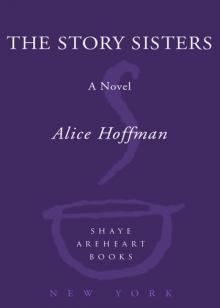 The Story Sisters
The Story Sisters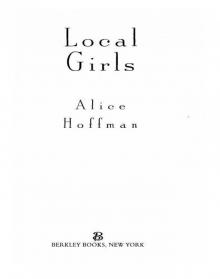 Local Girls
Local Girls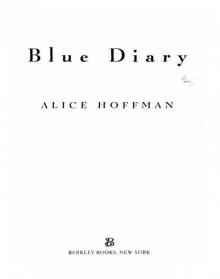 Blue Diary
Blue Diary The River King
The River King Here on Earth
Here on Earth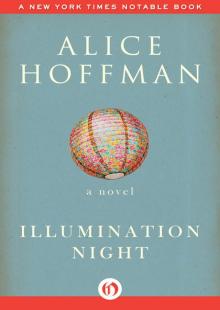 Illumination Night: A Novel
Illumination Night: A Novel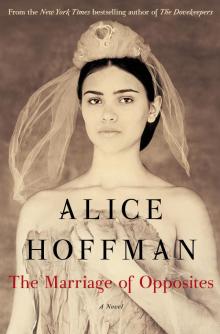 The Marriage of Opposites
The Marriage of Opposites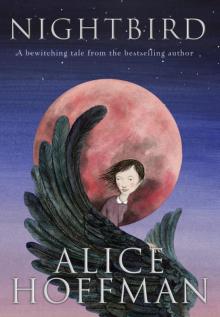 Nightbird
Nightbird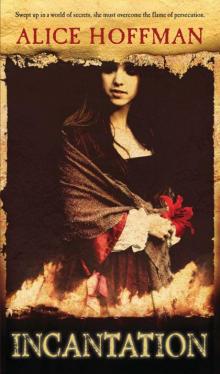 Incantation
Incantation Skylight Confessions
Skylight Confessions The Ice Queen
The Ice Queen Second Nature
Second Nature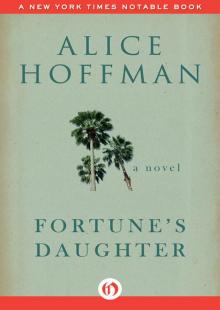 Fortune's Daughter: A Novel
Fortune's Daughter: A Novel Seventh Heaven
Seventh Heaven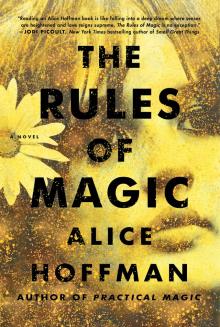 The Rules of Magic
The Rules of Magic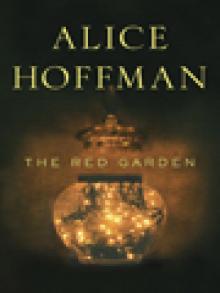 The Red Garden
The Red Garden The Third Angel
The Third Angel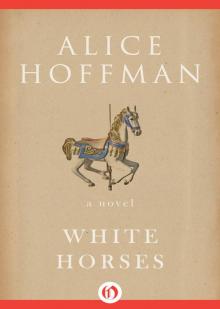 White Horses
White Horses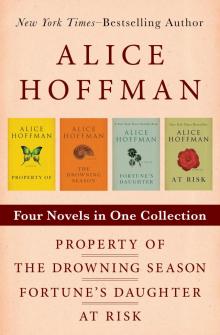 Property of / the Drowning Season / Fortune's Daughter / at Risk
Property of / the Drowning Season / Fortune's Daughter / at Risk Angel Landing
Angel Landing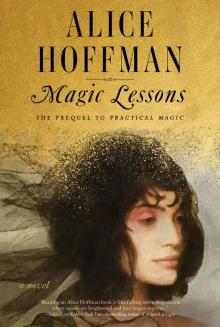 Magic Lessons
Magic Lessons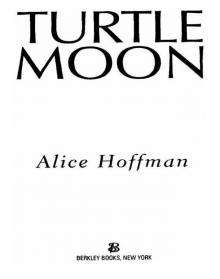 Turtle Moon
Turtle Moon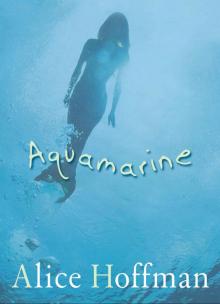 Aquamarine
Aquamarine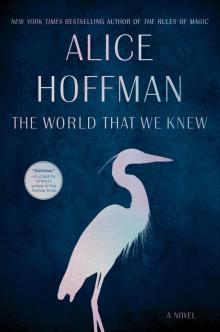 The World That We Knew
The World That We Knew Faithful
Faithful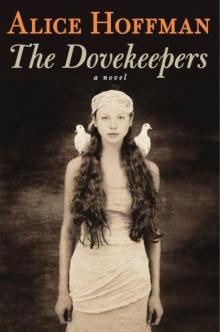 The Dovekeepers
The Dovekeepers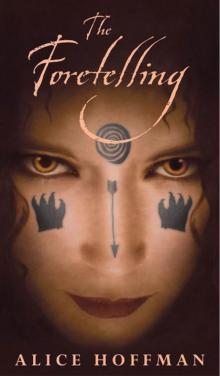 The Foretelling
The Foretelling Green Angel
Green Angel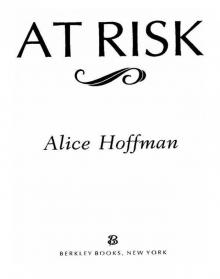 At Risk
At Risk Green Heart
Green Heart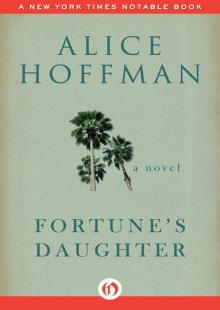 Fortune's Daughter
Fortune's Daughter Faerie Knitting
Faerie Knitting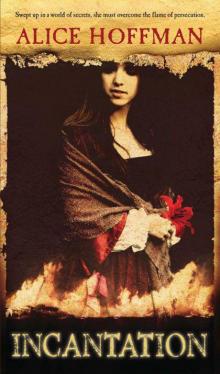 Incantation (v5)
Incantation (v5) Green Witch
Green Witch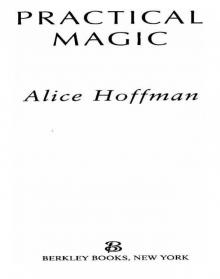 Practical Magic
Practical Magic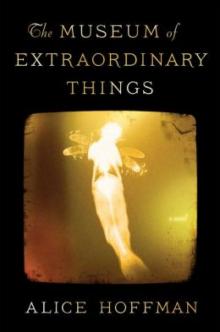 The Museum of Extraordinary Things
The Museum of Extraordinary Things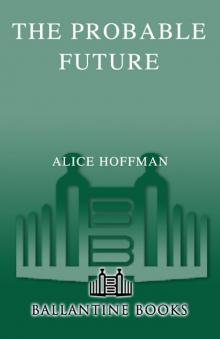 The Probable Future
The Probable Future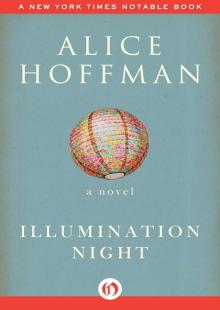 Illumination Night
Illumination Night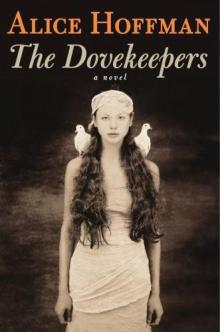 The Dovekeepers: A Novel
The Dovekeepers: A Novel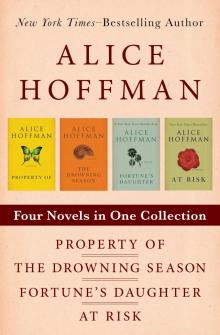 Property Of, the Drowning Season, Fortune's Daughter, and At Risk
Property Of, the Drowning Season, Fortune's Daughter, and At Risk